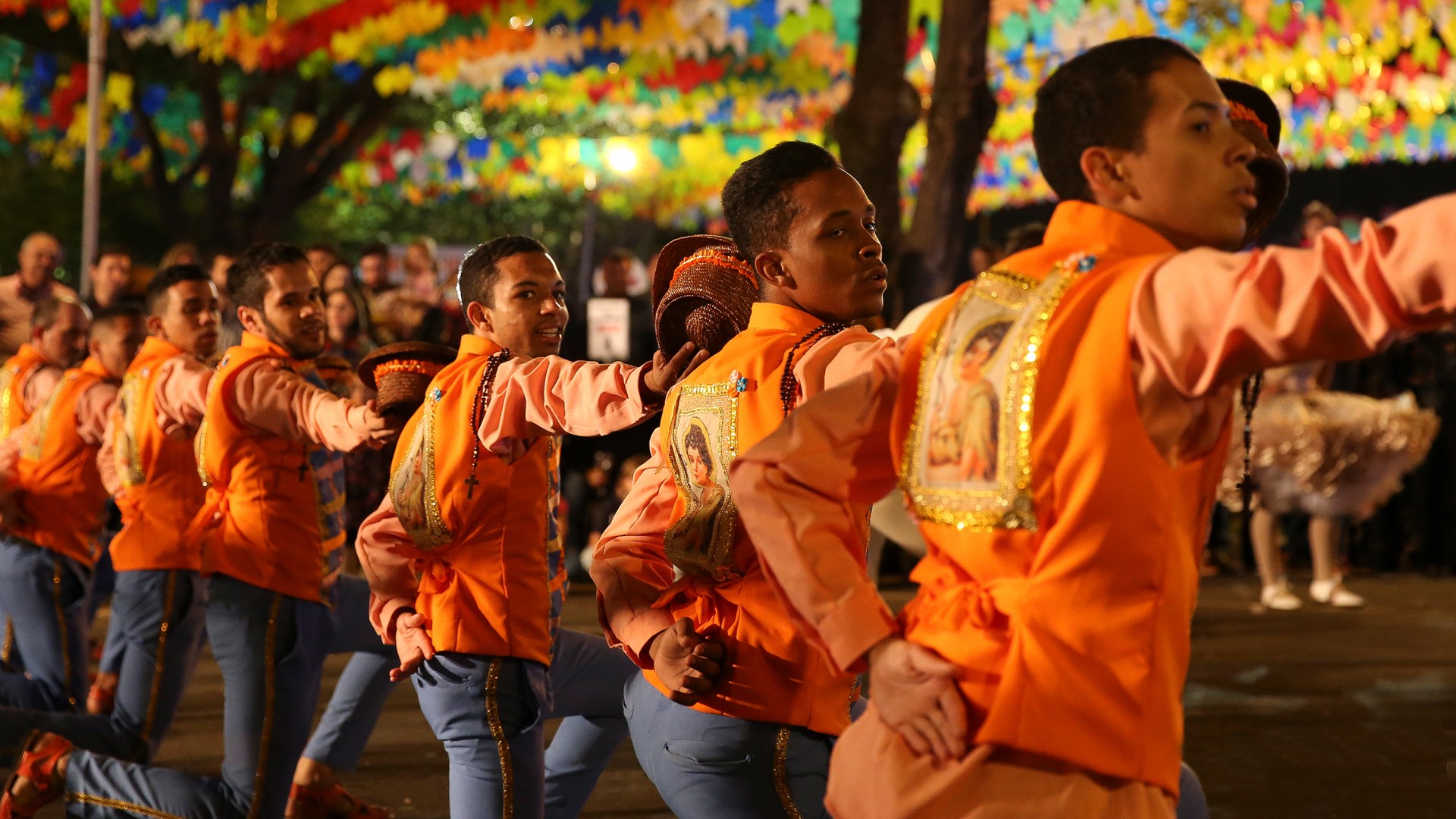When it comes to festivals, the world knows Brazil best for Carnival, its raucous celebration of Mardi Gras, full of elaborate costumes, dancing on the street, and revelry.
But ask many Brazilians, and they’ll tell you they enjoy their June festivals even more. Originating from European pagans to celebrate the arrival of summer and call for a bountiful harvest (hence the fact that they fall during the Northern Hemisphere’s summer), these fests were later co-opted by the Catholic church under Festa Junina, or a set of holidays celebrating saints Anthony, John the Baptist, and Peter. Later, Portugal exported the holiday to colonial Brazil, which has since transformed the festivities into a multiweek celebration marked by eating canjica (a dessert made from corn that has the consistency of a thicker porridge) and pamonha (creamed corn cooked inside corn husks), decorating streets with colorful flags, and streaming forró and baião songs from speakers.
Traditionally, those street parties were part of broader Catholic celebrations that included Masses and processions accompanied by images of the saints. Devotees followed, and many used this time to pay off promises made to the saints, which included walking on their knees as a penance or making donations to the parish.
Despite its Christian heritage, like Carnival, many evangelicals have similarly scorned Festa Junina, deeming Roman Catholic devotion to saints as idolatry. While some say that the word Junina comes simply from the name of the month, Junho (June), others say it stems from Joanina and is a nod to Saint John the Baptist, consequently making it a form of hagiolatry (worship of saints). In fact, the most celebrated festival is named after him, on June 24.
Christians who do celebrate these festivals say the customs changed long ago and today reflect an appreciation of the sertanejo music, food, dancing, and way of life.
Although they are celebrated throughout the country, these festivals are most grandiose in the Northeast. A region prone to severe droughts, the festivities occur at the beginning of the rainy season and serve as a promise of prosperous days ahead.
CT invited five Brazilian evangelical pastors and leaders in Northeastern Brazil to weigh in on whether evangelicals should feel comfortable participating in the June festivities. Responses were edited for length and clarity and arranged from yes to no.
Marcos Fróes, pastor of Casa da Bênção, a Pentecostal church of Maranguape, Paulista, Pernambuco
These religious festivals in celebration of Catholic saints coincide with the harvest season. Thanking God for the harvest is not something new. The Jewish people already celebrated the Feast of Weeks or the harvest, Shavuot, between May and June. During this period, all of Israel would go to Jerusalem to celebrate and bring offerings. They would eat and remember God's promise of a land rich in milk and honey.
Celebrating the harvest as an act of God's kindness and mercy is not a sin when done with a grateful heart to the Lord. Just as we rejoice in December at Christmas for the coming of Jesus our Savior, in June we celebrate the provided sustenance, recalling our rural origins, regardless of whether the occasion also honors the June saints or the June festivities.
Ricardo Leite, youth pastor at the Primeira Igreja Batista of Juazeiro do Norte, Ceará
In past decades, the presence of evangelicals at Festa Junina was practically nonexistent. Those who did take part were generally viewed negatively by their fellow community members. However, in more recent years, their participation has become more common. Some churches are incorporating elements of these festivals into their own events (traditional foods and bonfires, for example), and many converts see no reason to stop participating in parties they used to go to.
When Paul wrote [his first letter] to the Corinthians, he dealt with a similar situation about engaging in a non-Christian culture. In chapter 10, he offered three important principles. First, he told the early church that the question of whether or not one should take part in the festivities wasn’t a question of lawfulness but of appropriateness (1 Cor 10:23). What message are we signaling? Second, Paul wanted to know whether participation would be edifying. Would God's people come out stronger and more like Christ? Third, would their participation glorify God (10:31)? That is, would the presence of Christians doing a given action exalt God above all else?
I would advise Christians that if their answer to any of the three questions is negative, their conscience is already strongly declaring that they shouldn’t take part in it.
Pedro Pamplona, pastor of Igreja Batista Filadélfia, Fortaleza, Ceará
My answer depends on what you mean by Festa Junina. There is a diversity of cultural manifestations of this festival today, and many of them no longer have any connection with religious elements. Where I live in the Northeast, our food, decorations, and music associated with this time of year have no clear religious connection.
Therefore, if the specific festival includes Catholic content (like Masses and processions), practices, or worldly and immoral aspects, I don't see the participation of evangelicals as advisable. We have important disagreements that need to be taken into account. But if the festivities are limited to food, flags, and clothing, I see no impediment for evangelicals. Some families, companies, and schools hold gatherings, and I don't consider them sinful.
Thiago Italo Rocha, assistant pastor at Igreja da Família, a reformed church in Santo Antônio de Jesus, Bahia
This long-awaited festival is, in short, a tribute to the Catholic saints. In this sense, it is undeniable that the entire festival originates from the Catholic tradition, but over time, it gained a certain air of syncretism. Given strong anti-Catholic sentiment in Pentecostal, neo-Pentecostal, and (independent) community churches, the answer seems to be a resounding no. But perhaps, in the light of the Bible, this answer is not so simple.
The apostle Paul, when dealing with various controversies in the church of the Corinthians, seems to appeal to conscience and love. Most of the time, Paul seems interested in preserving the conscience of Christian brothers and sisters and avoiding scandal in the church (1 Cor. 10.32). The apostle also seems to want to warn those who are strong in the faith not to make their freedom a stumbling block. In this context, Paul argues, it would be better to abstain in love so that your brother or sister in Christ, seeing your freedom, doesn't want to take it as a model and commit sin against his or her conscience.
I understand that the São João festival has become largely a commercial event, and in many places we don’t even see remnants of original Festas Juninas. Within this reality, where the music and atmosphere are extremely sexualized, my advice to Christians would be to avoid such places. However, when it comes to craft fairs and traditional food venues, those who are mature in their faith would have no problem participating. The only thing they should watch out for is that they do not exercise this freedom in such a way that “the weak” don’t sin.
Looking at such situations in the light of the gospel, the truth is that we have one God and everything needs to be done for his glory. “Whether you eat or drink or whatever you do, do it all for the glory of God” (1 Cor. 10:31). As Christians, we need to avoid extremes—first, from imposing legalism and, second, from toxic freedom, pride, and inability to empathize with others’ hardships.
Sávio Vinícius, pastor at Primeira Igreja Batista of Valença, Bahia
If you consider the Festas Juninas something related to Saint John, the biblical command not to drink the cup of the Lord and the cup of demons is undeniable (1 Cor. 10:14–22).
As a leader, based on the principles found in 1 Corinthians 6:12–13 (you have the right to do anything, but not everything is beneficial) and 1 Corinthians 8:13 (you should avoid any behavior that may lead a brother or sister into sin), I don’t think it’s appropriate to get involved, even if it isn’t a Saint John celebration, as participating can confuse people.
However, I see no problem in celebrating traditional foods, clothes, and forró that glorify God at other times of the year or in other places. The main goal is to live for his glory in all things (Col. 3:23–24).













































